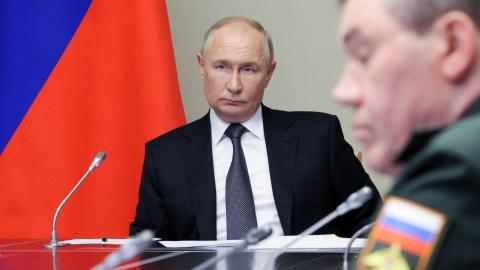Russia’s invasion of Ukraine took an unexpected turn last month when Ukrainian troops made a surprise move into Russia’s Kursk Oblast, capturing more than 1,200 square kilometers of Russian territory — a reminder that in wartime the unexpected can happen at any time.
With that in mind, it's crucial to examine the situation along Ukraine’s border with Belarus, a region that has the potential to become the next surprise hotspot in a war that has now dragged on for over two and a half years.
From the very beginning of Russia’s invasion in February 2022, Belarus has played a key supporting role. Belarus’s closest point to the Ukrainian capital, Kyiv, is only 100 km away. It was no surprise that Russia would use Belarusian territory to launch its invasion in the hopes of quickly capturing Ukraine’s seat of government.
This situation was made even easier for Russia by Belarusian President Aleksandr Lukashenko’s growing ties with Vladimir Putin. Lukashenko has become increasingly reliant on Russia, particularly after Moscow supported him during the mass protests in Belarus after the fraudulent August 2020 elections. With that support came obligations, making it difficult for Lukashenko to act against Putin’s interests. So when Russia began its military buildup before invading Ukraine, the use of Belarusian territory was a foregone conclusion.
Before the invasion, tens of thousands of Russian troops and thousands of pieces of equipment were staged in Belarus in preparation for the attack on Kyiv. Notably, some of the worst atrocities committed by Russian troops against Ukrainian civilians, such as those in Bucha, were carried out by units that had originated from Belarusian territory. Furthermore, Russian airstrikes regularly originate from Belarus to target Ukrainian infrastructure. Although Belarusian soldiers have not yet directly participated in combat, Belarus is clearly complicit in enabling Russia’s invasion.
Tensions along the Ukrainian-Belarusian border have escalated in recent months. Over the summer, Belarus positioned thousands of troops near the Ukrainian border in what Kyiv deemed a provocative move. While backchannel negotiations led to the repositioning of these troops farther from the border, suspicion remains high in Kyiv that Lukashenko, under pressure from Putin, may attempt a bolder move into Ukraine.
The Ukrainian advances in Kursk have taken the Kremlin by surprise. Moscow is now seeking ways to divert attention from this setback and regain momentum. One way it could do this is by pressuring Belarus to become directly involved.
History is full of examples of surprise attacks and unexpected developments in war, and those who dismiss the likelihood of Belarus entering the conflict are being naive. This possibility is taken very seriously by the Ukrainian leadership. During my most recent visit to Kyiv, I traveled outside the city toward the Belarusian border and noted the extensive fortifications being constructed by Ukrainian engineers. In private conversations with Ukrainian officials, they made it clear they do not seek a confrontation with Belarus but cannot rule out the possibility, given the close relationship between Minsk and Moscow.
So, what would a Belarusian military intervention look like, and what could it achieve? There are two primary scenarios.
The first would involve a joint Russian-Belarusian attack on Kyiv. Considering that Russia failed to capture the city when it had the element of surprise and Ukraine was poorly equipped, it is highly unlikely that a second such operation could succeed. However, Moscow would not need to capture Kyiv for the attack to be a success. Simply forcing Ukraine to redeploy troops from key positions on the frontlines in Donetsk could greatly benefit Russia. Additionally, Ukraine might be compelled to scale back its efforts in the Kursk region.
The second scenario could involve a joint Russian-Belarusian offensive into western Ukraine, with the goal of besieging Lviv near the Polish border and severing or disrupting crucial supply lines that link Ukraine with its Western partners. Western Ukraine has been spared from direct ground combat, though it has faced numerous airstrikes. Disrupting the supply routes that arm and equip Ukraine would be a significant blow to the Ukrainian war effort. Moreover, a fresh wave of refugees would probably flee westward into the EU. Russian and Belarusian forces would not need to capture or hold territory in the West: their mere presence could force Ukraine to redeploy troops from the eastern front.
However, such a move by Belarus would come with considerable risks for Lukashenko’s regime and could backfire on Russia. Compared with Ukrainian soldiers, many of whom are battle hardened and some of the best equipped in the world, Belarusian forces are not as experienced or capable. Belarusian casualties would likely be high in a direct confrontation with Ukrainian troops. Additionally, Lukashenko understands that his rule is already precarious, and a deeply unpopular war with Ukraine could spark civil unrest, possibly leading to his removal or forcing Russia to intervene directly in Belarus to stabilize his regime.
Lukashenko is therefore in a difficult position. He knows he is beholden to Putin, but he also realizes that an open war with Ukraine would be terrible for Belarus. For global policymakers observing the war, no scenario can be dismissed. As Ukraine continues to hold captured territory in Kursk and as Russian advances in Donetsk slow to a crawl with mounting casualties, the Kremlin may grow increasingly desperate to shift the war’s momentum. For Russia, pressuring Belarus might seem like the best option. For Belarus, it would be disastrous.
Enjoyed this article? Subscribe to Hudson’s newsletters to stay up to date with our latest content.



















